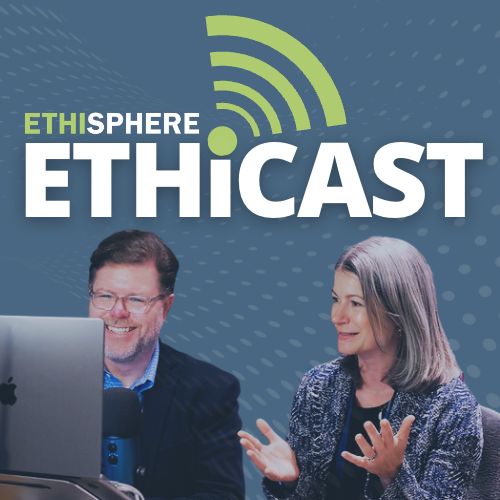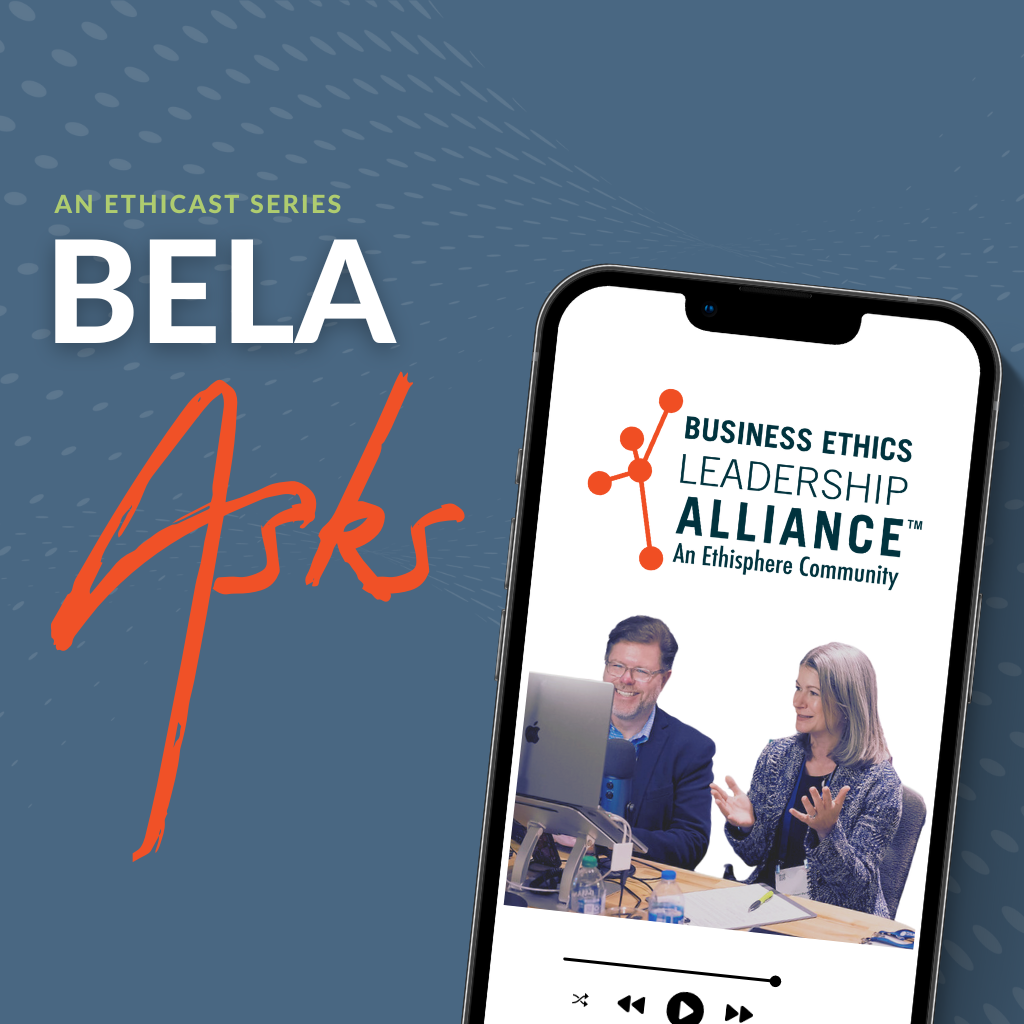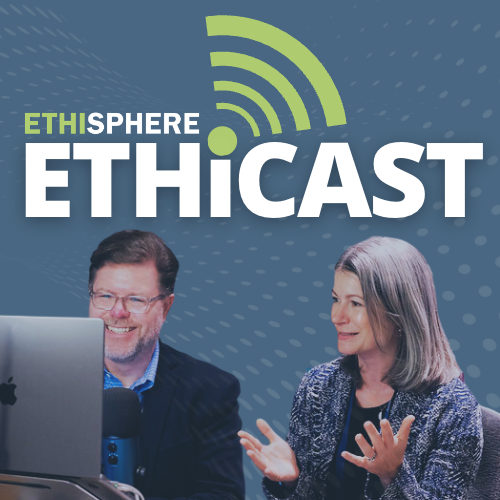Episode Transcript
[00:00:00] Speaker A: Hi everyone. Today we'll look at some of the best practices that have earned electric utility FirstEnergy the compliance leader Verification recognition from Ethisphere. I'm your host, Bill Coffin and this is the Ethicast.
FirstEnergy is one of the largest investor owned electric systems in the United States. Headquartered in Akron, Ohio, the company's subsidiaries and affiliates are involved in distributing, transmitting and generating electricity, energy management and other energy related services for more than 6 million customers in Ohio, Pennsylvania, New Jersey, West Virginia, Maryland and New York. FirstEnergy's companies operate a vast infrastructure of more than 269,000 miles of distribution lines and and are dedicated to providing customers with safe, reliable and responsive service.
As a privately held, fully regulated utility, FirstEnergy has dedicated itself to building a best in class ethics and compliance program. And these efforts have yielded such impressive results that Ethisphere has recognized FirstEnergy with the coveted Compliance Leader Verification designation for 2025 through 2026.
Joining us today to discuss FirstEnergy's E&C program is Chairman, President and Chief Executive Officer Brian X Tier and Vice President and Chief Ethics and Compliance Officer Antonio Fernandez. Together they lead a dedicated team of compliance professionals with a focus on strengthening FirstEnergy's ethics and compliance function. Gentlemen, welcome to the program and congratulations Once again on FirstEnergy's Compliance Leader Verification recognition.
[00:01:44] Speaker B: Good morning, Bill. Thank you for having us with you today. We're looking forward to the conversation.
[00:01:48] Speaker C: Hey Bill, good to see you.
[00:01:49] Speaker A: Your ethics and compliance function is performing at a very high level of maturity. Can you talk about how long it's taken for you to get your program to this level and what such a strong commitment to excellence in this area says about First Energy in general?
[00:02:04] Speaker B: You know, Bill, we've really focused on this in a very, very meaningful way since 2021. And a large part of that was recruiting a high talented person like Antonio to lead the effort for us, having him then bring in talent behind him, people who believed in what he was doing, what we're doing as a company and making it a priority from the board to senior management, middle management, and throughout the company. And so it's like any other business priority, make it a priority, get the right people in place and support it wholeheartedly throughout the initiative.
[00:02:34] Speaker C: And Bill, you know what? I would add to that, When I look back to when I arrived at the company in 2021, it was very clear that we needed to establish trust and transparency in our program and to really rebuild the program. And as we went about doing that it became very clear that it was important that we not only had the right program structures and people, but also the cultural commitment across everybody at the company, from the board on down, that integrity is something that's unwavering for the company and something that we really are.
That it is truly part of the fabric of what the company does. So as we went about doing that, we established a program where we had a series of actions that we tracked and very publicly to all of our stakeholders communicated on, and our stakeholders, not only internally, but also externally, like our shareholders. And we went about that work in a very transparent and methodical way where we clearly communicated the efforts that were going on, the status of them as we completed them. We let people know. And I believe that because we were so transparent and intentional about that approach, it really did end up creating greater trust in the company because people could see what we were doing, could measure it, and they could feel it as far as the employees. And it is something that I think Brian and I hear frequently from employees, that employees appreciate this commitment and this effort to really embed integrity into everything that we do.
[00:04:09] Speaker A: An ethics and compliance team doesn't get to this level without robust support from senior leadership. What are some of the ways that FirstEnergy's ENC team and senior management harmonize to ensure that the ethics and compliance program is moving the needle as much as it can organizationally?
[00:04:25] Speaker B: Bill, we prioritize it all the time. So, you know, Antonio reports to our audit committee. We just had audit committee meetings this week. He was reporting out to them on what we're doing. We talk about it at the board level. And then when we're in front of employees, we have things like integrity minutes. And so constantly keeping integrity is one of our core values. Constantly keeping this as a North Star to what it is we're doing keeps it a priority all the time, and we're focused on it. And the activities that Antonio mentioned and will mention are the things that we do to keep the effort moving forward.
[00:04:58] Speaker C: And, Bill, what I would add to that is whenever we think about ethics and integrity, we think about it as being a foundational aspect of everything that we do. It is one of the values for the corporation, and it is something that we try to deeply embed in everything that we do. And a couple of the ways in that we do that is the chief ethics and compliance officer is part of Brian's team. I am very fortunate to sit with the rest of what we call our executive council, which is our senior most committee of management. And as A result of being part of that group, the ethics and compliance team. And integrity as a cultural value is part of all of our conversations. It's part of our strategy retreat with our board, is part of our conversations about how we're doing operationally. So when we discuss ethics and compliance, it's not a one off program or a siloed function. It is part of the company's business strategy and we treat it as such and we hold it accountable as such. So the Office of Ethics and Compliance has operational metrics that it has to accomplish and we report out on it, not just to Brian and his management team, put out to all employees. And again, I think that tends to also drive greater trust because of the level of transparency around what we're doing.
The other thing that I would add is that we are very intentional about our risk assessment, something that Brian, his team and managers and employees throughout the company participate in. And we look to see are we spending our time, money, effort in the right things. So we assess our risks, we compare our risks against our business strategies and the efforts that we have ongoing. And we make sure that we right size those approaches so that they're tailored to really mitigate to the things that we're really concerned about. So we try really, really hard that it's not a one size fits all, that it's responding to the needs of management and the company and employees.
[00:06:57] Speaker A: We often talk about how important it is to engage people leaders as a way to promote compliance, but also as a way to advance ethical culture. How does your E and C team engage with middle management so that those leaders are equipped to be your front line on matters of business Integrity?
[00:07:13] Speaker B: Yeah, people leaders are crucial to what we're doing. We have something called an Integrity Liaison program to make sure that we designated people who represent our commitment to integrity and ethics and live those values at work and outside of work. And we've made those people leaders in our effort. Having that Integrity Liaison program is critical to what we do. And then, you know, I said this before, it's leading meetings with an integrity moment, making sure it's always front and center to what we do. And as Antonio said earlier, it's not just a program. It's part of how we behave and how we conduct business.
[00:07:49] Speaker C: And as you think about that population that we just talked about, those middle managers, they often are part of the secret ingredient to unlocking what we always talk about being the operationalization of the ethics and compliance program. Right. It's not just something that sits on a shelf. It's not a poster. It's not just your code of conduct that people might open it up to see if they're in trouble when they did something. You try to make sure that this group of people, because we know from our employee surveys how this group of people acts, how they communicate with employees, has a disproportionate amount of impact to how employees perceive the company's commitment to ethics and compliance. So as a result, we spend a lot of time and effort and resources on really providing that group of people what they need so they can effectively lead. And the way we do that, I'll highlight things that we do that I think are very effective. One, we have established a resource center internally where managers and supervisors can go and receive training tidbits of information about, you know, if they want to do an integrity minute, what should they cover? How do they do that on demand training that relates to concern management and creating a good and healthy, psychologically safe work environment. So we try to meet employees where they are and try to make sure that they receive that information in the way that it's easiest for them. They're not having to figure out these things on their own. The other thing that we do is that we provide these managers a council, an integrity council, which is director employees, that level of employee at the company come together once a quarter with the leadership team of the Office of Ethics and Compliance, and they give us feedback. We're very intentional about asking them, how are we helping you? Is the training that we're providing you something that meets your expectations? That. Did you find it boring? Tell me more about that. Really have a very open and candid conversation. And Brian and I talk about these kind of things all the time. When he gets his insider trading training, I get live feedback about, you know, how him and others feed. And that is, I think, one of the things that is kind of the secret sauce of a good program, which is that you're always listening to your internal customers and that the program is giving them what they need.
Oftentimes we see sometimes firms are very focused on what the program needs. We really need to move it out to our internal clients. And what do they need? What is it that supports them in ensuring that they are being compliant and acting with integrity?
[00:10:22] Speaker A: There are plenty of organizations out there that would like to get their ENC program to the level where yours is at right now. What advice would you have for ENC leaders who are trying to prioritize these strategic initiatives that will create a strong program over time?
[00:10:38] Speaker B: I would say do what you would do with any other important corporate strategic initiative. Flesh out what you're looking for, where you're trying to get hire the right talent. Antonio's ours. You can't have him hire the right talent and then and then support it throughout. It's not a one and done initiative. It's a strategic initiative. It's something that you're going to work to over time, plan, execute, measure, correct your progress along the way and treat it like any other business priority and you'll get where you need to go.
[00:11:12] Speaker C: Bill, Very hard to follow that. The one thing I'll say, and it is something that over my 20 years of sort of doing this, that has become more important to me, is the performing of a compliance risk assessment. It sounds very in the weeds, it sounds granular, it sounds maybe not as strategic, but it is one of the best ways for you to get a sense for what is it that the company really needs from the program. And we all have limited resources. When you're trying to prioritize the resources that you have, it's so much better to have that be a metrics driven conversation where you have assessed where the risks of the company sit, you've assessed the quality of the controls that you've placed to prevent those risks or mitigate them. And then you can be very purposeful and intentional about where you apply the resources and the people that you have so that you get the best bang for your buck, if you will.
[00:12:12] Speaker A: Brian and Antonio, thank you so much for joining us today and for giving us a look inside your ENC program and at the culture of ethics at FirstEnergy. And one more time, congratulations on earning this much deserved compliance leader verification recognition.
[00:12:26] Speaker B: Thank you, Bill.
[00:12:27] Speaker C: Thank you, Bill.
[00:12:29] Speaker A: To learn more about the great work that Brian, Antonio and the rest of the FirstEnergy team are doing, visit FirstEnergy Corp.com and hit the About Us tab to learn more about the Compliance Leader Verification program. And to see how well your ethics, compliance and ESG programs compare to your peers, visit ethisphere.com solutions thanks for joining us. We hope you've enjoyed the show. For new episodes each week, be sure to subscribe on YouTube, Apple Podcasts and Spotify. And until next time, remember, strong ethics is good business.


